#AcademicPerformance
Explore tagged Tumblr posts
Text
Why You Should Not Use ChatGPT for Your Academic Papers
In today's digital age, the temptation to use AI-generated content like ChatGPT for academic papers may be alluring, but it comes with significant pitfalls. This essay highlights why students should refrain from relying on AI tools for their academic work, emphasizing the importance of genuine learning, ethical concerns, and the risks of academic dishonesty.
Loss of Genuine Learning:
Dependence on AI-generated content deprives students of the opportunity to develop critical thinking, research, and writing skills. Genuine learning occurs through the process of exploration and inquiry, which AI cannot replicate.
Ethical Concerns:
Using AI-generated content without proper citation raises ethical concerns. Academic work should reflect the author's original thought and effort, and failing to give credit to AI-generated sources constitutes plagiarism.
Inaccuracies and Misinformation:
AI-generated content may contain inaccuracies, outdated information, or biased perspectives. Relying solely on AI risks presenting flawed or misleading data in academic work.
Academic Dishonesty:
Using AI to complete assignments or essays can be classified as academic dishonesty in many educational institutions. This can lead to severe consequences, including failing grades or even expulsion.
Limited Personal Development:
Academic work is not just about the end result but the journey of personal growth. Engaging with the material, conducting research, and formulating arguments are valuable experiences that should not be replaced by AI convenience.
Using AI for academic work undermines learning, ethics, and integrity while missing out on personal growth. Genuine education values knowledge and skill acquisition through challenges, not shortcuts.



#college life#student#study#studying#university#student life#college#study space#study hard#exam stress#studystudystudy#online exam#funny content#funny jokes#uni life#students#ai#academicperformance#study notes
47 notes
·
View notes
Link
Mastering Collaboration: Finding the Ideal School Study Group
Discover how to select the best school study group for your learning style and academic goals. Maximize collaborative learning with expert tips from Explain Learning.
#studygroup#academicperformance#learning#schoolstudygroup#rightschoolstudygroup#USA#Education#E-learning
3 notes
·
View notes
Text
instagram
#StudySuccess#ExamPreparation#TimeManagement#JKSGroup#AcademicPerformance#StudySkills#StressFreeStudies#AchieveYourGoals#EducationMatters#Instagram
0 notes
Text
The Impact of Sleep on Teenage Wellbeing and Academic Performance
Teenage wellbeing is closely linked to sleep quality and duration. During adolescence, the body undergoes critical development, both physically and emotionally. Sleep supports this development by allowing the brain to process emotions, consolidate memories, and regulate hormones. When teenagers don’t get enough sleep, it can lead to mood swings, anxiety, and even depression. According to the CDC, teenagers should get at least 8 to 10 hours of sleep per night to ensure optimal wellbeing.
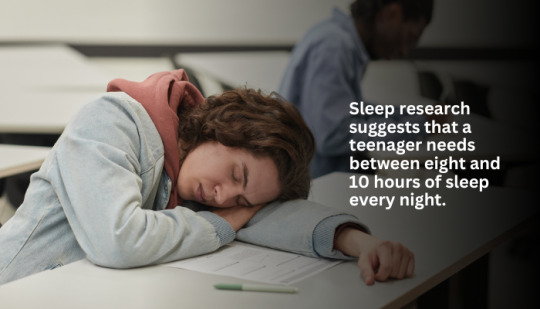
#TeenageSleep#SleepandWellbeing#AcademicPerformance#TeenHealth#SleepHabits#Mental Health in Teens#Sleep Deprivation#Education and Sleep#Sleep Studies#Student Wellness#Healthy Sleep Patterns#Teen Stress Management
0 notes
Text
Unlocking the Power of Reading: Transform Your Mind and Life
Introduction to the Power of Reading Reading is not merely a pastime; it’s a profound cognitive exercise that can profoundly impact our lives. The act of reading engages our brains in intricate ways, stimulating neural connections, enhancing cognitive abilities, and fostering emotional intelligence. In this comprehensive guide, we explore how reading influences various aspects of our mental and…

View On WordPress
#AcademicPerformance#BookRecommendations#BrainFunction#CognitiveDecline#CognitiveEnhancement#creativity#CriticalThinking#CulturalAwareness#EmotionalIntelligence#empathy#Imagination#MentalWellBeing#personalgrowth#PowerOfReading#ReadingBenefits#ReadingHabit#SelfImprovement#SleepQuality#StressReduction#VocabularyExpansion
0 notes
Text
Madras University Result 2024 is Expected To be Announced Today
It is anticipated that Madras University Result 2024 will be revealed today, March 29, 2024. The following instructions will let students get their results as soon as they are made accessible, as they eagerly await their release:
1. Visit the Official Website: Go to Madras University's official website. Typically, the website offers easy access to links and announcements about results. 2. Find the Result area: On the homepage of the website, look for the "Results" or "Examination" area. This is probably where links to results announcements will be found.
3. Choose Exam and Year: After finding the results section, you might have to choose the particular exam and year you want to look up the results for. Here, select "Madras University Result 2024."
#Madras University Result 2024#MadrasUniversity#Result2024#ExamScores#AcademicPerformance#StayUpdated#LatestResults#MadrasUni2024#UniversityResults#TopPerformers#Scorecard
0 notes
Text
Stockton Schools' New Plan: Building a Positive Learning Environment for Students #academicperformance #attendancerates #communityengagement #cultureoflove #Englishlanguagelearners #excessiveforce #graduationrates #mentalhealthservices #parentalinvolvement #positivelearningenvironment #restorativejusticepractices #StocktonUnifiedSchoolDistrict #studentdiscipline #studentwellbeing #superintendent #supportiveeducationalenvironment. #teachertauntingstudent #trustbuilding
#Politics#academicperformance#attendancerates#communityengagement#cultureoflove#Englishlanguagelearners#excessiveforce#graduationrates#mentalhealthservices#parentalinvolvement#positivelearningenvironment#restorativejusticepractices#StocktonUnifiedSchoolDistrict#studentdiscipline#studentwellbeing#superintendent#supportiveeducationalenvironment.#teachertauntingstudent#trustbuilding
0 notes
Link
#AcademicPerformance#Animal-AssistedTherapy#BehaviorManagement#Canine-AssistedEducation#ClassroomDynamics#DogProgramsinSchools#DogsinEducation#emotionalsupportanimals#EmpathyandCompassion#InclusiveLearning#SchoolWell-being#SocialSkillsDevelopment#SpecialEducation#StressReduction#therapydogs
0 notes
Text
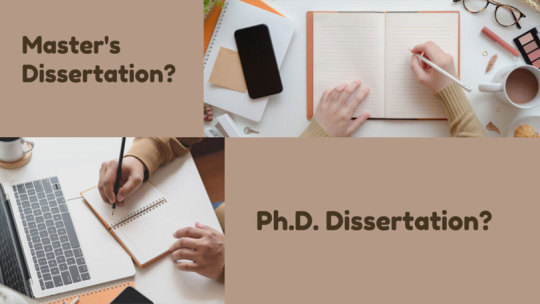
Boosting Academic Performance Through Online University Paper Buying This article aims to explore how buying university papers online can enhance academic achievements. With this, students have access to professional writers
0 notes
Text
Metacognitive: Know Who You Are!
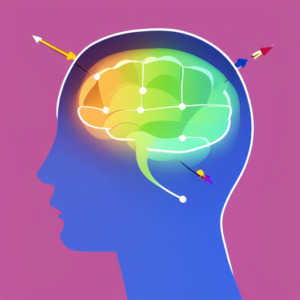
Metacognition is a notion that stands out in the expansive and complicated terrain of cognitive research due to its significant influence on both learning and self-awareness. What is "metacognition," and why is it so crucial? This in-depth resource will lead you on a trip through the complexities of metacognition, illuminating its function in improving learning, problem-solving, and self-evaluation.
Learning to Think About Your Thinking

Know Who You Are The Meaning of "Metacognitive" The psychologist John Flavell invented "metacognition" to describe this kind of self-reflective thought. It's the capacity to manage, alter, and reflect upon one's mental operations. It's the instrument with which we may plot out our approach to a problem, keep track of how much we've learned, fix our errors, and assess our progress. It's like having a birds-eye perspective of our mental terrain, making it easier to go about it. The Development of Reflective Thinking The study of cognition is where "metacognition" was first introduced. Flavell initially proposed it in the late 1970s, and ever since then, it's been the focus of several studies and discussions. Our knowledge of metacognition has been steady growth and development throughout the years. It has ramifications for education, psychology, neuroscience, and beyond and is now widely acknowledged as an essential part of learning and cognitive development. Understanding and Controlling Your Metacognition The term "metacognition" describes both the awareness of one's thinking and the ability to control one's thinking. The ability to reflect on and improve one's learning and thought processes is known as "metacognitive knowledge." It involves knowing oneself cognitively, the task, and how to approach the job best. Metacognitive regulation, on the other hand, is actively managing one's thought processes to optimize learning. This entails thinking through how we'll tackle a problem, keeping tabs on our progress, and assessing the final product.
Metacognition's Crucial Function in Instruction
The Role of Reflection in Learning Our learning habits are significantly influenced by metacognition. Understanding how we learn allows us to modify our study methods to maximize comprehension and retention. If we know, for instance, that we retain more information via active participation than through passive listening, we may tailor our learning strategies accordingly. Similarly, if we need clarification about a specific issue, we may devote more time to it or seek outside assistance. The Role of Metacognition in Improving Cognitive Capacity Metacognition boosts our mental capacity by allowing us to keep tabs on and direct our learning. This can increase students' ability to understand the material, solve problems, and succeed academically. For instance, by tracking how much we learn about a subject, we might locate knowledge gaps and work to fill them. By controlling our thoughts, we may choose the best methods for us while studying and solving problems. The Role of Reflective Thinking in Education Using metacognition, we can assess the efficiency of our learning methods and make any required improvements. This has the potential to improve learning outcomes. For instance, if we discover that we do not recall knowledge from our readings, we may adopt a new method, such as taking notes or engaging in group discussions.
The Learning Strategy of Metacognition
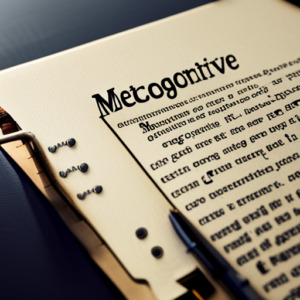
Metacognitive The Value of Self-Aware Learning Learning is facilitated through metacognitive thinking. It entails understanding our thoughts and using this knowledge to direct our study methods. Metacognitive thinking might involve questions like, "Do I understand this concept? What parts are still unclear? What can I do to improve my understanding? How should I study to retain this information?" Using Metacognition to Improve Academic Performance Teaching students to self-reflect on their learning via planning, monitoring, and evaluating is at the heart of a metacognitive approach to education. Several methods exist, including introspective inquiry, testing, and writing. Teachers may, for instance, suggest that students pose queries to themselves before, during, and after acquiring a new skill. They may also mean that students keep a learning notebook to record their thoughts and reflections on the material they've covered. Teaching with a Focus on Metacognition Journaling, class discussions, and self-evaluation activities are all great examples of metacognitive practices that may be used in the classroom. Teachers may assign activities where students reflect on their learning and growth, such as writing about their thinking processes when solving a problem, discussing their learning tactics in small groups, or utilizing a self-assessment rubric to evaluate their work. Students who engage in these strategies may improve their ability to reflect on and improve their learning processes.
Controlled and Reflective Thinking in Learning
The Theory Behind Self-Controlled Studying Learners engage in self-regulated learning when they take responsibility for their knowledge, including developing their learning techniques, solving their problems, and evaluating their performance. It entails deciding what you want to learn, picking a method to get you there, putting it into action, and checking in to make any necessary adjustments. Learners who can self-regulate take charge of their education. They are self-directed learners enthusiastic about acquiring new knowledge and skilled at modifying their approach to achieve their academic objectives. The Role of Metacognition in Motivated, Independent Study Self-regulated learning relies heavily on the use of metacognition. Learners may keep tabs on their progress, alter their strategies, and assess their performance. A self-regulated student may use metacognition to create a study schedule, check their progress in learning the material, determine how well they did on a test, and modify their study methods accordingly. Self-Regulated Learning and the Function of Metacognition Engaging in self-reflection and self-regulation via metacognition is essential for effective learning. "metacognition" refers to how students organize their approach to a learning assignment, track their progress, assess their performance, and modify their learning tactics accordingly.
Understanding and Control of Metacognition
Recognizing the Role of Metacognition in Learning The ability to reflect on and improve one's learning and thought processes is known as "metacognitive knowledge." It involves knowing oneself cognitively, the task, and how to approach the job best. These habits include recognizing that we do better on tasks that call for us to use our critical thinking abilities, using flashcards to aid with memorization, and so on. Metacognitive Control of Learning Processes The ability to monitor and modify one's cognitive processes to optimize learning is known as metacognitive regulation. This entails thinking through how we'll tackle a problem, keeping tabs on our progress, and assessing the final product. We may tailor our study time to meet our specific needs by setting objectives, testing our knowledge using self-quizzes, and analyzing our test results for weak spots. The Interplay of Metacognition and Self-Regulation The combination of metacognitive knowledge and self-regulation facilitates learning. Metacognition is the ability to regulate and manage one's learning processes based on one's awareness of how learning occurs. One example of metacognitive control is the decision to study in a library rather than a noisy café based on the attention that one learns best in a peaceful setting.
Thoughtful Reflection and Mental Operations
The Role of Reflection in the Learning Process There is a tight connection between metacognition and other types of thinking. The ability to engage in metacognition improves our capacity for both learning and solving problems. Metacognition allows us to track how well we're grasping a situation, keep tabs on how we're handling it, and make adjustments as we go along. The Contributions of Metacognition to Improved Cognition Metacognition improves our learning, memory, and decision-making by letting us see and modify our mental operations. Metacognition allows us to keep tabs on how well we're retaining information, how well we're controlling our study tactics, and make adjustments to both as needed. Metacognition's Crucial Function in Academic Success Successful learning requires the use of metacognition. Metacognition aids understanding by allowing us to organize our study sessions, keep track of our development, and assess how well we're doing. If we want to learn something difficult, we may use metacognition to create a study plan, keep track of how well we're doing, and adjust our approach as needed.
Learners' Growth in Metacognition
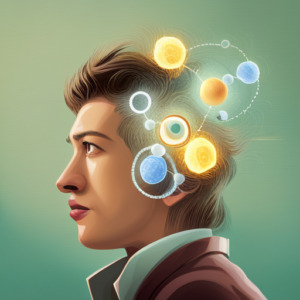
Learners' Growth In Metacognition Developmental Trajectories of Metacognition Developing one's metacognitive abilities through time is known as metacognitive growth. There are often a series of increasingly sophisticated phases involved in this development, from an early awareness of cognitive processes to an advanced mastery of these abilities. For instance, the capacity to plan, monitor, and assess one's cognitive processes may develop in stages; young children may first have a rudimentary knowledge of their mental processes, while older children and adults acquire these skills. Metacognition and Its Effect on Academic Performance The cultivation of metacognition may significantly aid learning. Improved performance in these areas is possible when students strengthen their metacognitive abilities via deliberate practice. Students who have honed their metacognitive skills may be better able to organize their study time, keep track of what they've learned, and assess how well they did on an exam. Methods for Fostering Metacognitive Growth Explicit education in metacognitive abilities, experience using these skills, and feedback on performance are just a few methods that may boost metacognitive growth. Teachers may model effective study strategies, give students adequate time to put those strategies into practice and provide constructive criticism to help them improve.
From Intuitive to Reflective Metacognition in Students
The Four Stages of Metacognitive Development in Students There are four distinct types of metacognitive learners: tacit, conscious, strategic, and reflective. Each tier stands for a different proficiency and understanding of metacognition. While intended learners have some knowledge of their cognitive processes, tacit learners have little to no control over them. While both strategic and reflective learners are in charge of their thought processes, reflective learners actively regulate and reflect on their mental activity. Taking the Leap from Ignorant to Wise One must first cultivate metacognitive abilities and awareness to transition from implicit to explicit learning. Direct teaching, repeated practice, and constructive criticism all help. Teachers may model using metacognitive skills, provide students time to practice them, and offer constructive criticism to help them improve. Reflection's Crucial Function in Metacognitive Development Reflection is essential. Taking stock of our thoughts allows us to understand our learning processes, pinpoint problem areas, and fine-tune our methods. After finishing an assignment, students could take stock of their performance, note any obstacles they ran against, and formulate a strategy for future success.
Learning Environment Influences on Metacognition
The Role of Metacognition in the Conventional Classroom Metacognition is best developed in the conventional classroom via explicit teaching, guided practice, and reflective exercises. Teachers may help students develop metacognitive skills by providing direct education on these skills, modeling their use during learning activities, and prompting students to reflect on their learning processes and results. The Role of Metacognition in Virtual Classrooms Metacognition is especially important for self-regulated learning in virtual classrooms. Students taking courses online are responsible for their learning techniques, knowledge monitoring, and assessment of progress. Learners who use metacognitive processes, including goal-setting, self-questioning, and self-evaluation, report higher satisfaction with studying online. The Role of Metacognition in Informal Learning Metacognition may be helpful in non-formal settings, such as self-directed study at home or in the community. A student could use metacognition to organize their study sessions, keep track of their development, and assess their progress and achievement.
Learning How to Learn: Metacognition
Learning Over a Lifetime: The Importance of Metacognition Metacognition is an essential part of learning that lasts a lifetime. As people committed to learning throughout their lives, we must regularly assess and revise our learning approaches to successfully tackle novel challenges. Because of metacognition, we can do this, which improves the quality and speed of our learning. The Role of Metacognition in Persistent Education Metacognition paves the way for individual learning management, essential for lifelong education. A flexible approach to learning is possible via careful goal setting, regular progress checks, and honest self-evaluation.
The 21st Century Value of Metacognition
Metacognition is an essential competency in the 21st century, as students are expected to take charge of their education and rely on digital tools. It paves the way for us to efficiently manage our learning and continue growing as individuals throughout our lives.
Conclusion
Metacognition Is the Master Key to Human Intelligence; when used effectively, metacognition (or "thinking about thinking") may improve learning, problem-solving, and introspection. To maximize our capacity for learning and problem-solving, we must first gain awareness of and mastery over our mental processes. Read the full article
#academicperformance#cognitivedevelopment#LearningStrategies#lifelonglearning#metacognition#metacognitivegrowth#problem-solving#reflectivethinking#self-reflection#self-regulatedlearning
0 notes
Text
I made an academic comeback last year, but I dropped my grades again, idk if I can do it again during my finals 😭😭.....
#exam stress#student#studying#university#student life#study#study space#study hard#college life#college#academicperformance#academic essay#students#semester#stress#funny stuff#my wriitng#writer problems#essay writing#writers on tumblr#writing
4 notes
·
View notes
Link
🏫 Van Bokkelen Elementary School is a public school located in Severn, Maryland. It serves students from kindergarten to fifth grade with an enrollment of approximately 600 students. The school is part of the Anne Arundel County Public Schools system and has a diverse student population. 🎓 Van Bokkelen Elementary School has a strong academic program that focuses on providing students with a well-rounded education. The school offers a variety of programs, including special education, gifted and talented, and English language learners. The faculty and staff are committed to providing a safe and nurturing environment that encourages students to reach their full potential. 👩🏫 The school has a dedicated team of teachers who work closely with students to ensure that they are receiving the best education possible. The curriculum is designed to meet the needs of all students and includes a variety of subjects such as math, science, social studies, and language arts. In addition to academics, the school also offers extracurricular activities such as music, art, and sports.1. Location and History of Van Bokkelen Elementary SchoolVan Bokkelen Elementary School is located in Severna Park, Maryland, USA. It was established in 1966 and named after the Van Bokkelen family, who were prominent in the area's history. 📍 Severna Park, Maryland, USA 📅 Established in 1966 👨👩👧👦 Named after the Van Bokkelen family The school has undergone several renovations and expansions over the years to accommodate the growing student population. It currently serves over 500 students from pre-kindergarten to fifth grade. 🏫 Renovations and expansions over the years 👥 Serves over 500 students from pre-kindergarten to fifth grade Van Bokkelen Elementary School is known for its strong academic programs, including a focus on science, technology, engineering, and math (STEM) education. It also offers a variety of extracurricular activities, such as music, art, and sports. 📚 Strong academic programs, including STEM education 🎨 Extracurricular activities, such as music, art, and sports 2. Curriculum and Academic Programs Offered at Van Bokkelen Elementary SchoolVan Bokkelen Elementary School offers a comprehensive curriculum that focuses on the development of students' academic and social skills. The school's academic programs are designed to meet the needs of all students, including those with special needs. The school offers a range of academic programs, including Language Arts, Math, Science, Social Studies, and Art. These programs are designed to provide students with a well-rounded education that prepares them for success in the future. Van Bokkelen Elementary School also offers a variety of extracurricular activities, such as sports teams, music programs, and clubs. These activities provide students with opportunities to explore their interests and develop their talents outside of the classroom. The school's faculty is composed of highly qualified and experienced teachers who are committed to providing students with a quality education. They use a variety of teaching methods and strategies to engage students and help them achieve their full potential. At Van Bokkelen Elementary School, the focus is on providing a safe and supportive learning environment that fosters academic excellence and personal growth. The school's mission is to prepare students to become lifelong learners who are responsible, productive, and engaged members of their communities. 🎓📚🏫3. Extracurricular Activities and Clubs at Van Bokkelen Elementary School🎉 Van Bokkelen Elementary School offers a variety of extracurricular activities and clubs for students to participate in. 🎨 The Art Club allows students to explore their creativity and express themselves through various mediums. 📚 The Book Club provides a space for students to discuss and analyze literature, improving their critical thinking skills. 🎵 The Music Club teaches students how to play instruments and sing, promoting teamwork and discipline. 🌱 The Garden Club teaches students about gardening and sustainability, promoting environmental awareness. 🏃♂️ The Sports Club offers a range of sports activities, promoting physical fitness and healthy competition. 🤖 The Robotics Club teaches students about coding and engineering, promoting problem-solving skills. 🎭 The Drama Club allows students to explore their acting abilities and express themselves creatively. 🌎 These provide students with opportunities to learn new skills, make friends, and have fun.4. Facilities and Resources Available at Van Bokkelen Elementary SchoolVan Bokkelen Elementary School provides a variety of facilities and resources to enhance students' learning experience. State-of-the-art computer labs with the latest software and hardware for technology-based learning. A well-stocked library with books, e-books, and online resources for research and reading. Science labs equipped with modern tools and equipment for hands-on experiments and investigations. A spacious auditorium for school assemblies, plays, and musical performances. The school also has a gymnasium for physical education classes, sports teams, and recreational activities. Outdoor playgrounds with swings, slides, and climbing structures for students to enjoy during recess. A cafeteria that serves nutritious meals and snacks to students and staff. A nurse's office staffed by a registered nurse to provide medical care and support to students. Special education classrooms and resources for students with diverse learning needs. Van Bokkelen Elementary School strives to provide a safe, inclusive, and supportive learning environment for all students. 👍🏼📚💻🔬🎭🏀🍎👩⚕️👨🎓5. Faculty and Staff Members at Van Bokkelen Elementary School Van Bokkelen Elementary School has a dedicated team of faculty and staff members who work tirelessly to provide quality education to their students. Ms. Johnson, the principal, leads the school with passion and expertise. Mr. Smith, the school counselor, provides guidance and support to students. Ms. Lee, the art teacher, encourages creativity and self-expression in her students. The school also has a team of dedicated support staff who keep the school running smoothly. Ms. Rodriguez, the school secretary, greets visitors with a smile and keeps the office organized. Mr. Davis, the custodian, keeps the school clean and safe for everyone. Ms. Brown, the lunchroom supervisor, ensures that students have a healthy and enjoyable lunchtime. The are committed to providing a safe and nurturing environment where students can learn and grow. 6. Parent and Community Involvement at Van Bokkelen Elementary SchoolAt Van Bokkelen Elementary School, we believe that parent and community involvement is crucial to the success of our students. Parents can volunteer in the classroom, attend parent-teacher conferences, and participate in PTA meetings. Community members can serve as guest speakers, provide resources, and sponsor school events. We encourage all families to get involved and stay informed about their child's education. Our school website and social media pages provide regular updates and important information. We also offer workshops and events to help parents support their child's learning at home. Through collaboration and partnership, we can create a strong and supportive learning environment for our students. 👨👩👧👦🎉📚7. Achievements and Awards of Van Bokkelen Elementary School 🏆 Van Bokkelen Elementary School has been recognized as a Maryland Blue Ribbon School. 🎉 The school has received the National Blue Ribbon School Award twice, in 1990 and 2013. 🏅 Van Bokkelen Elementary School has been named a Maryland Green School since 2010. 👨🏫 The school's principal, Dr. Karen Salmon, was named Maryland's Principal of the Year in 2008. 📚 The school has been recognized for its outstanding reading program by the International Literacy Association. 🎭 Van Bokkelen Elementary School's drama program has won numerous awards, including Best Musical at the Maryland Theatre Festival. 🎨 The school's art program has been recognized with awards from the Maryland Art Education Association. In conclusion, Van Bokkelen Elementary School is a top-rated institution that provides students with a well-rounded education. With its highly qualified teachers, state-of-the-art facilities, and engaging curriculum, students are well-equipped to succeed in their academic pursuits. 🎓 Parents can rest assured that their children are in good hands at Van Bokkelen Elementary School. The school's commitment to academic excellence and student success is evident in its impressive track record. 🏆 Overall, Van Bokkelen Elementary School is an excellent choice for families seeking a quality education for their children. From its welcoming atmosphere to its rigorous academic standards, this school is sure to provide students with a solid foundation for their future. 👍 https://van-squad.co.uk/van-bokkelen-elementary-school-overview/?_unique_id=6491c15396c1f
#Uncategorised#academicperformance#communityinvolvement#educationsystem#studentactivities#VanBokkelenElementarySchool#aiomatic_0
0 notes
Text
The Power of Mindfulness for Students
Hey Tumblr,
We've all been there - buried in books, cramming for exams, our minds buzzing with deadlines and worries. It's easy to forget to take a breath, to live in the moment. That's where mindfulness comes in.
Mindfulness is not just a buzzword; it's a practice that can bring focus, reduce stress, and enhance our overall well-being. But how can we make mindfulness a part of our busy student lives?
We've just published a comprehensive guide titled "Mindfulness Activities for Students: Cultivating Focus and Well-being". This post is brimming with various mindfulness techniques - from breathing exercises and guided meditation, to mindful studying habits and technology use.
Even better, we delve into how these practices can be incorporated into school settings, creating a learning environment that promotes mental well-being alongside academic growth.
Whether you're a student, teacher, or parent, we believe that mindfulness can transform the educational experience, bringing a sense of calm and focus amidst the hustle and bustle of student life.
Check out the blog post [Mindfulness Activities for Students] and let's start a conversation about bringing mindfulness into the classroom!
#Mindfulness#Students#Education#AcademicPerformance#StressReduction#Focus#Wellbeing#MindfulTechniques#StudyHabits#MindfulTechnologyUse#ClassroomMindfulness#Meditation#BreathingExercises#spiritual community#the spiritual parrot
0 notes
Text
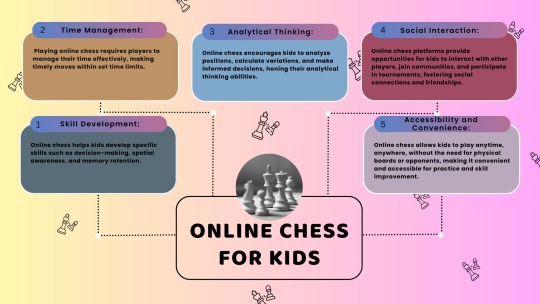
How Does Chess Affect Children? Exploring the impact of Chess Classes for Kids-
Chess is a timeless game, and its effects on children span far beyond its board. Recently, online chess classes for kids have gained popularity as an effective way to introduce this intellectually stimulating game. But how exactly does chess affect children? In this article, we'll look into all the benefits of these online classes for kids as a means of stimulating cognitive, social, emotional, and academic development through this strategic game.
Cognitive Development:
Chess has long been recognized for its ability to strengthen children's cognitive development. When exposed to online chess classes, children engage in critical thinking, problem-solving, and strategic planning through critical analysis, problem-solving, and strategic planning activities. Chess also enhances spatial awareness and pattern recognition which leads to enhanced mathematical and scientific skills.
Social Development.
Chess is an individual game, yet also offers opportunities for socialization and collaboration, including online. Online chess classes for kids allow children to engage with peers who share an interest in chess; virtual tournaments and clubs enable kids to share strategies while learning from each other's strategies and discussing tactics - giving children invaluable lessons in sportsmanship, patience, respectful competition as well as building interpersonal skills that extend far beyond chessboard boundaries - such as empathy development, adaptability, effective communication strategies.
Emotional Development
Chess has an enormous effect on the emotional development of children. Playing the game helps children manage their emotions and become resilient against challenges, with online chess classes providing both victories and defeats to teach resilience, manage successes graciously, and rebound after setbacks gracefully. Chess also fosters perseverance, self-control, and emotional maturity allowing kids to deal with adversity with grace while simultaneously building self-confidence as children track their achievements through continuous learning and practice.
Academic Performance
Chess has numerous cognitive advantages, and can also have a beneficial effect on academic performance. Chess develops skills such as critical thinking, problem-solving, and logical reasoning - which directly contribute to academic success - in children by teaching them to think strategically, consider multiple perspectives, and make informed decisions - skills that translate directly to mathematics, logic, and reading comprehension learning areas. Studies have also demonstrated that students who play chess tend to perform better academically - often displaying increased problem-solving ability, creativity, and higher standardized test scores than their nonplaying counterparts.
FAQs-
Are online chess classes appropriate for children of all ages?
Yes, online chess classes for children of various age groups are designed specifically to cater to them. Beginners, as well as more advanced classes, are offered so children can learn at their own pace - whether your child is completely new to chess or has the experience, there will be suitable online classes tailored to meet his/her skill level.
Can online chess classes help develop critical thinking abilities?
Absolutely! Chess is an engaging way for children to develop critical thinking, strategic planning, and the ability to anticipate future moves. By participating in online chess classes, children engage in analytical thinking, problem-solving, and decision-making - all essential skills for developing critical thinking abilities which have positive ramifications beyond chess and into other aspects of academic and personal lives as well.
Conclusion:
Online chess classes for kids offer numerous advantages to help children grow both cognitively, socially, emotionally, and academically. Children engaged in this strategic game sharpen their critical thinking abilities while forging important social ties. Furthermore, engaging in this game helps develop emotional resilience while strengthening critical thinking abilities.
#ChessForKids#ChessClasses#CognitiveDevelopment#SocialSkills#EmotionalGrowth#AcademicPerformance#CriticalThinking#ProblemSolving#StrategicThinking#ChildDevelopment
1 note
·
View note
Text
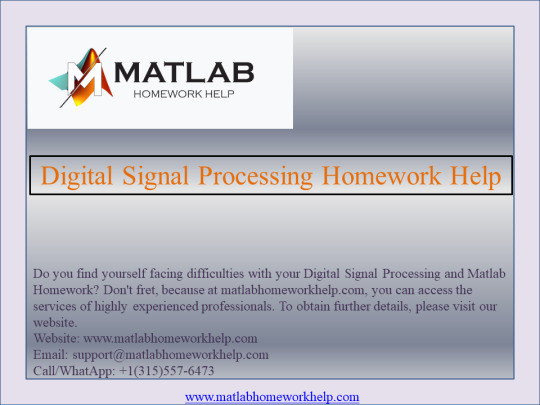
Are you struggling to keep up with your MATLAB homework or digital signal processing homework? Don't worry, we've got your back! At www.matlabhomeworkhelp.com, we provide expert assistance in all aspects of MATLAB and digital signal processing, as well as other academic tasks. Our team of top industry experts is dedicated to providing high-quality, timely assistance that will help you achieve academic success.
We understand that these subjects can be challenging, and that's why we offer tailored coaching and assistance to help you excel. Our experts have years of experience in the field and can provide you with personalized guidance to ensure that you fully understand the concepts. We also provide access to materials and tools that may not be available to students, further enhancing your knowledge of the subject.
Whether you need help with MATLAB homework or digital signal processing, our website has got you covered. Our services are designed to help you achieve good grades and enhance your academic performance. Don't let homework stress you out - visit www.matlabhomeworkhelp.com today and get the help you need to succeed! Email: [email protected] Call/WhatsApp: +1(315)557-6473
#MATLABhomeworkhelp#digitalSignalProcessing#homeworkhelp#expertassistance#topindustryexperts#academicperformance#tailoredcoaching#personalizedguidance#academicstandards#MATLABhelp#DSPhelp#mathhelp#academicexcellence#goodgrades#collegestudent#universitylife#studytips#academicstress#academicpressure#educationmatters#studentlife
0 notes
Photo

Explore the top 10 schools in KCSE 2024 and discover what sets them apart in academic excellence and holistic development. read the full article: https://bit.ly/4gMNKxZ #KCSE #Education #TopSchools #Kenya #AcademicPerformance read more: top 10 schools in kcse 2024
0 notes